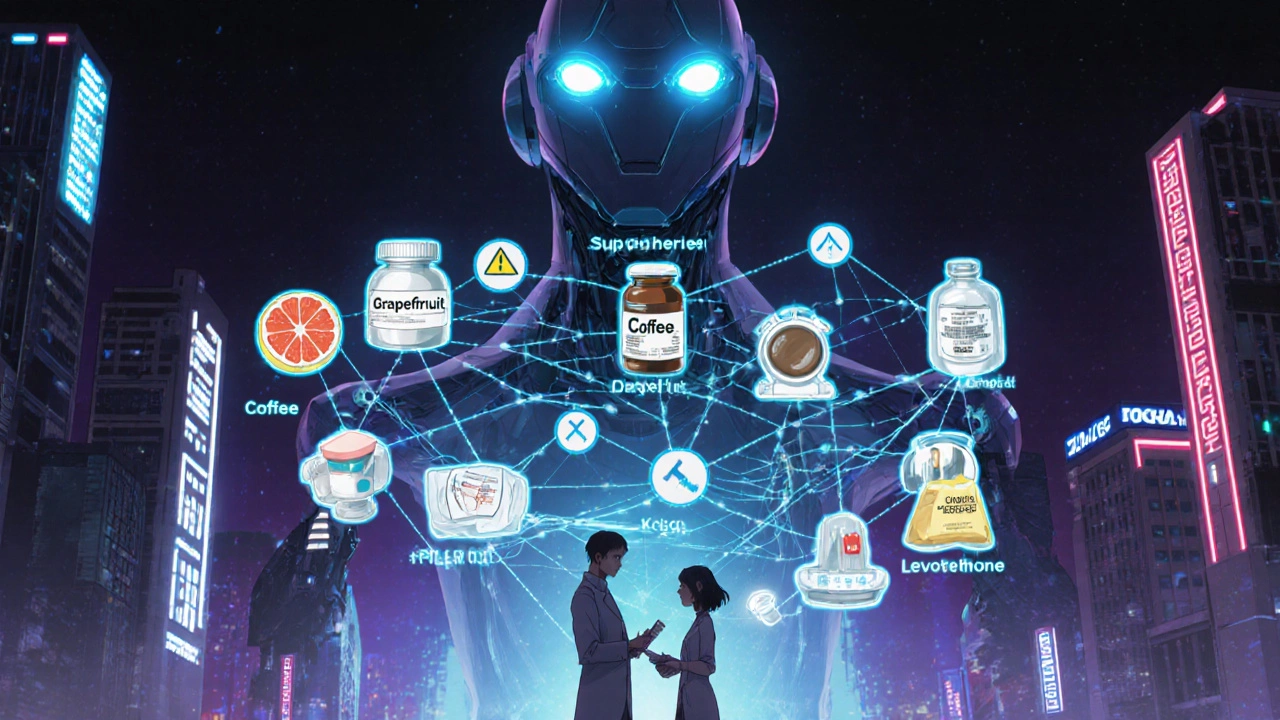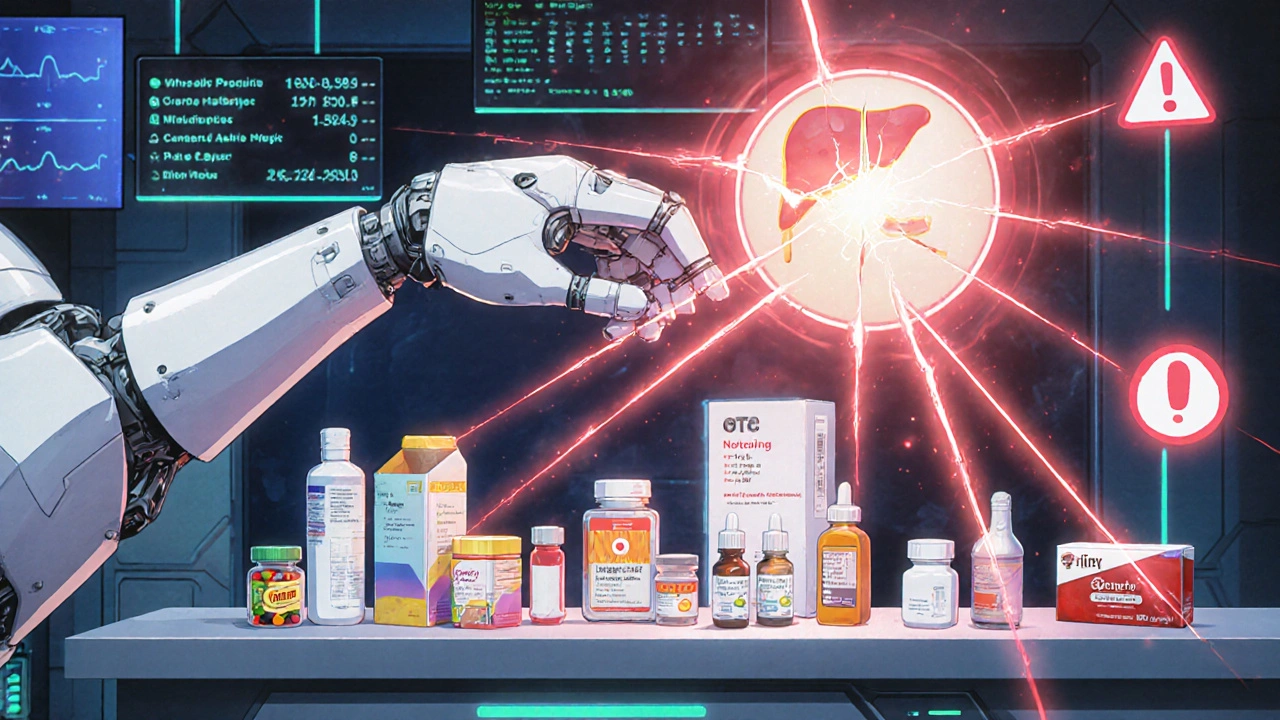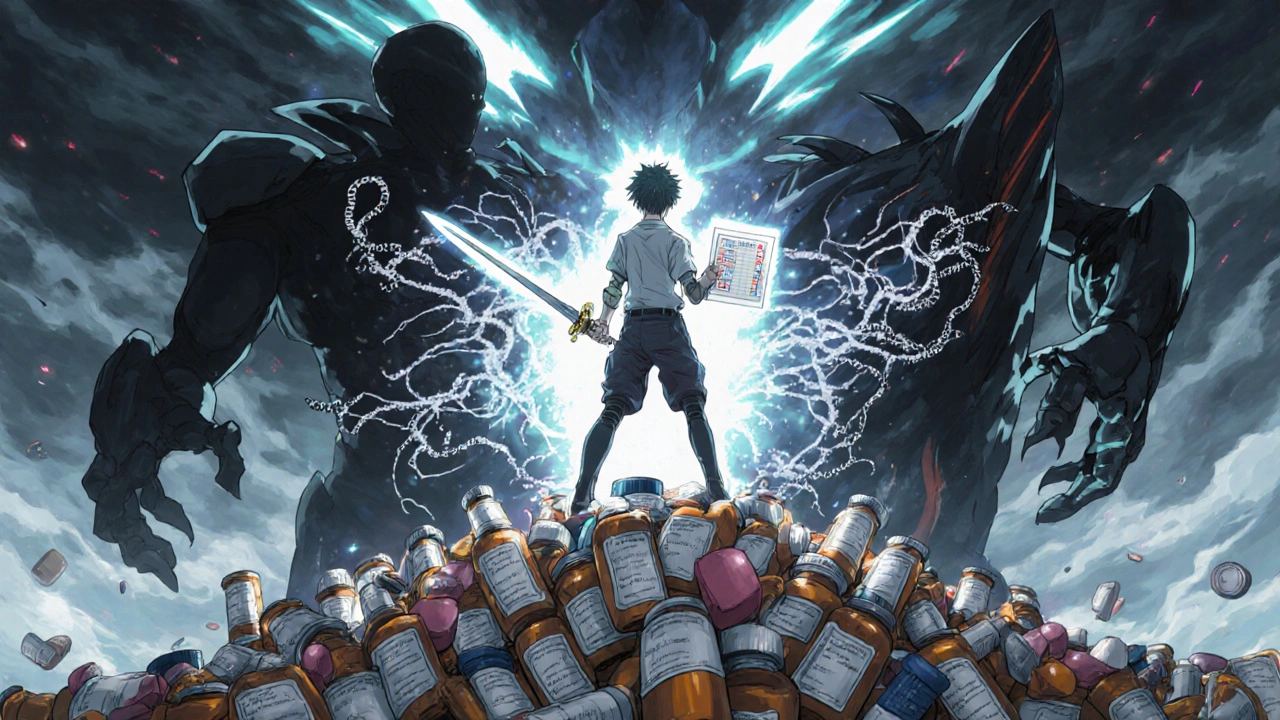Questions to Ask Your Pharmacist About Medication Interactions
 Oct, 28 2025
Oct, 28 2025
Every year, over a million people in the U.S. are hurt because of medication errors - and nearly 7% of those cases come from dangerous medication interactions. You might think your doctor has covered everything, but pharmacists are the real experts when it comes to how your pills, supplements, and even your food might clash. They don’t just hand you your prescription - they know what happens when your blood pressure med meets your grapefruit juice, or when your sleep aid teams up with your allergy pill. The problem? Only about 38% of patients get a full conversation about these risks. You can’t wait for them to ask. You need to ask first.
What other medications, supplements, or OTC drugs does this interact with?
Start here: "Does this medicine interact with anything else I’m taking?" It sounds simple, but most people forget to mention the little stuff. That daily vitamin? The melatonin for sleep? The ibuprofen for your back pain? All of it matters. Pharmacists see interactions that doctors miss - like how calcium supplements can cut the absorption of levothyroxine (thyroid medicine) by up to half. Or how St. John’s Wort can make antidepressants, birth control, or even blood thinners stop working. Don’t just say "I take vitamins." List every pill, capsule, gummy, or tincture you swallow. Exact names and doses. If you’re not sure, bring the bottles.Are there foods or drinks I should avoid?
Grapefruit juice isn’t just a healthy breakfast addition - it’s a silent saboteur. It blocks an enzyme in your gut (CYP3A4) that breaks down about 85 prescription drugs. That means your statin, like atorvastatin, could build up to 1,500% higher levels in your blood, raising your risk of muscle damage or kidney failure. Same goes for Seville oranges, pomelos, and even some herbal teas. But it’s not just grapefruit. Antacids like Tums can mess with Hepatitis C drugs. Dairy can interfere with antibiotics like ciprofloxacin. Alcohol? It can turn metronidazole into a nausea-inducing nightmare or make your painkiller more likely to damage your liver. Ask your pharmacist: "Is there anything in my fridge or pantry I should skip?"What about alcohol or caffeine?
More than 40% of adults take at least one medication that reacts badly to alcohol. Even one drink can raise your blood pressure if you’re on an ACE inhibitor. It can make sedatives like benzodiazepines dangerously strong. Caffeine isn’t harmless either. If you’re on an asthma inhaler like albuterol or an antidepressant like fluoxetine, too much coffee can spike your heart rate or trigger anxiety. If you’re on stimulants for ADHD, caffeine can make jitteriness unbearable. Don’t assume "a little" is safe. Ask: "Can I have my morning coffee or a glass of wine with this?"Are there activities I should avoid?
Some meds make you dizzy. Others make you sunburn faster. Medications like doxycycline, sulfa drugs, or even some diuretics can cause photosensitivity - meaning your skin reacts like it’s been under a tanning lamp. One day in the sun, and you could blister without realizing why. Others, like certain antihistamines or opioids, can make driving or operating machinery unsafe. Ask: "Will this make me drowsy, dizzy, or more sensitive to the sun?" If you’re active, work outdoors, or drive for a living, this isn’t a minor detail - it’s a safety issue.
What signs should I watch for if something’s wrong?
Knowing what to look for can save you a trip to the ER. Serotonin syndrome - from mixing SSRIs with certain painkillers or supplements like 5-HTP - can cause agitation, rapid heartbeat, high fever, and muscle rigidity. Bleeding risk from warfarin and cranberry juice? Watch for unusual bruising, nosebleeds, or dark stools. An allergic reaction to a new antibiotic? Hives, swelling, trouble breathing. Your pharmacist can tell you the red flags specific to your meds. Write them down. Share them with a family member. If you feel off - even mildly - call them. Don’t wait until it’s an emergency.Will I need blood tests or monitoring?
Some drugs need tracking. Warfarin requires regular INR blood tests. Lithium, used for bipolar disorder, needs kidney and thyroid checks. Even common drugs like metformin or statins can affect liver or kidney function over time. If your pharmacist says your med has interaction risks, they should also say: "We’ll need to check your levels every X weeks." If they don’t, ask. Medicare Part D and many insurance plans now cover annual medication reviews - use them. These aren’t just checkups; they’re safety nets.What if I miss a dose or take it wrong?
Timing matters. Taking levothyroxine with food or calcium can slash its effectiveness. Taking antibiotics with dairy can make them useless. Some meds need to be taken on an empty stomach. Others should be taken with food to avoid nausea. If you forget a dose, should you double up? Should you wait until tomorrow? Your pharmacist knows the exact protocol for your specific drug. Don’t guess. Don’t Google it. Ask them. And if cost is an issue - and switching brands or generics might change how your body handles the drug - ask about patient assistance programs. A cheaper pill isn’t helpful if it interacts differently.
How do I keep track of everything?
Keep a live list. Not on a napkin. Not in your head. Use your phone’s notes app, a printed sheet, or a free app like MyMedSchedule. Include: brand and generic names, dose, time of day, reason you’re taking it, and whether it’s prescription, OTC, or supplement. Update it every time you start or stop something. Bring it to every appointment - doctor, pharmacist, ER. Pharmacists at CVS and Walgreens now have apps that scan your meds and flag interactions, but they’re only 63% accurate. Your pharmacist’s brain is still the best tool. Make them work for you.What about herbal or natural products?
Just because it’s "natural" doesn’t mean it’s safe. Herbal supplements aren’t regulated like drugs. A 2022 study showed herbal supplement use jumped nearly 24% in a year. And they’re full of hidden risks. Kava can damage your liver. Garlic and ginkgo can thin your blood like aspirin. Echinacea can interfere with immune drugs. If you’re taking anything from a health food store, a Chinese medicine shop, or even a friend’s recommendation - tell your pharmacist. They’ve seen the cases: people on blood thinners who took turmeric supplements and ended up in the hospital. They’re not judging. They’re trying to keep you alive.Can you help me report an interaction if something happens?
If you experience a bad reaction - even if you’re not sure it’s the medicine - report it. The FDA’s MedWatch program now lets you submit reports directly through their mobile app. In just six months, over 12,000 people used it to report interactions. Your report helps others. Your pharmacist can guide you through it. They know exactly what details to include: what you took, when, what happened, and how severe it was. Don’t assume it’s "just a side effect." If it’s unusual, it’s worth reporting.Pharmacists have more training in drug interactions than any other healthcare provider. They hold doctorates in pharmacy. They spend their days studying how your meds behave in your body - not just what they’re supposed to do, but how they fight with everything else. But they can’t help if you don’t speak up. You’re the only one who knows your full list of meds, your habits, your diet, your lifestyle. Don’t wait for them to ask. Bring your list. Ask the questions. Be the person who doesn’t just fill the prescription - but understands it.
Can I take my medication with food if it doesn’t say to avoid it?
Not always. Some medications work best on an empty stomach because food can slow or block absorption. Others need food to reduce stomach upset. Always check the label or ask your pharmacist - even if it doesn’t say "take on an empty stomach." For example, taking levothyroxine with breakfast can cut its effectiveness by 30-50%.
Do over-the-counter drugs really interact with prescriptions?
Yes - and often more than you think. Common OTCs like ibuprofen, antacids, and cold medicines can interfere with blood pressure drugs, antidepressants, and blood thinners. For example, ibuprofen can reduce the effectiveness of some blood pressure medications and increase bleeding risk when taken with warfarin. Always list every OTC product you use - even if you only take it occasionally.
Why don’t pharmacists always warn me about interactions?
Many pharmacies use automated systems to flag dangerous interactions, but they don’t always explain them. Pharmacists are often rushed, especially during busy hours. A 2023 study found only 47% of pharmacists consistently discuss food or drink interactions. That’s why you need to ask - don’t wait for them to bring it up. Your health is worth the extra minute.
What if I’m taking a new medication and already take several others?
This is when you need to be most careful. Each new drug adds another layer of potential interaction. A 2021 study found that people taking five or more medications have a 50% chance of experiencing at least one interaction. Bring your full list - including supplements - to your pharmacist before starting anything new. They can spot hidden risks your doctor might miss.
Can my pharmacist change my medication if there’s a bad interaction?
They can’t prescribe a new drug, but they can recommend alternatives to your doctor. Many pharmacists work closely with prescribers and can suggest safer options - like switching from a statin that reacts badly with grapefruit to one that doesn’t. If you mention an interaction, ask: "Is there another medication that works the same way but won’t clash?"
If you’re on multiple medications, take a moment today to write down everything you’re taking - even that one vitamin you only use in winter. Then call your pharmacy and ask for a quick interaction check. It takes five minutes. It could save your life.
Rhonda Gentz
October 28, 2025 AT 19:46It’s wild how we treat pharmacists like vending machines instead of the clinical experts they are. I used to just grab my script and leave. Then my grandma had a near-fatal interaction between her blood thinner and a new herbal blend she thought was "just for immunity." She didn’t tell anyone. No one asked. Now I bring my whole pillbox to every visit. Even the gummies. Even the ones I only take when I’m stressed. They notice things doctors don’t have time to. And honestly? It’s the only time I feel like my health isn’t just a transaction.
Alexa Ara
October 30, 2025 AT 00:16This is so needed. I used to think "natural" meant safe until my cousin ended up in the ER after mixing turmeric with her chemo. Pharmacists aren’t here to judge-they’re here to keep you alive. If you’re on more than three meds, schedule a med review. Seriously. It’s free with most insurance. Five minutes could save you from a hospital stay. You’re worth the effort.
Olan Kinsella
October 31, 2025 AT 03:05Let’s be real-the whole system is rigged. Big Pharma pays pharmacists to push pills, not protect you. They don’t want you asking questions because then you’d realize most of these drugs are just fancy placebos with side effects that could kill you. Grapefruit juice? That’s nature’s way of saying "stop taking this poison." The FDA? They’re owned by the same people who make the meds. You think they want you to live? No. They want you to keep buying.
Kat Sal
November 1, 2025 AT 16:12YES. I’m a nurse and I still forget to ask about interactions. I started keeping a Google Doc with every pill I take-brand, dose, time, reason, and whether it’s Rx or supplement. I update it every Sunday. My pharmacist now calls me if something new looks risky. It’s not weird. It’s smart. And if you’re embarrassed to bring your bottle collection? Good. That means you’re finally taking your health seriously. Keep going.
Rebecca Breslin
November 2, 2025 AT 17:40Most people don’t even know what CYP3A4 is. That’s why they die. I’ve seen it. The guy who took St. John’s Wort with his SSRI and went into serotonin syndrome? He thought it was "just an herbal mood booster." No. It’s a chemical grenade. And if you’re taking anything from a Walmart shelf labeled "all-natural" without checking with your pharmacist, you’re playing Russian roulette with your liver. I’m not being dramatic. I’ve seen the autopsy reports.
Kierstead January
November 3, 2025 AT 23:21Why are we letting unlicensed pharmacy techs handle our meds? Real pharmacists are being replaced by robots that spit out pills and say "take with food" without even looking at your chart. And don’t get me started on how Medicare pushes generic switches without testing for bioequivalence. Your $4 pill isn’t the same as the $40 one. Your body knows. And it’s screaming. You just ignore it until your kidneys fail. Wake up. This isn’t healthcare. It’s corporate survival.
Imogen Levermore
November 5, 2025 AT 02:20Chris Dockter
November 6, 2025 AT 11:36Gordon Oluoch
November 7, 2025 AT 16:59Nick Zararis
November 8, 2025 AT 12:42Just did my med review yesterday. Took 20 minutes. Pharmacist caught that my calcium supplement was blocking my thyroid med. I’d been taking them together for 2 years. She showed me the graph-my TSH levels were skyrocketing. I cried. Not because I was sick. Because I’d been so careless. I’m now using the CVS app to track everything. And I text my mom the list every week. She’s 78. She needs this too. Don’t wait for disaster. Do it today.
Sara Mörtsell
November 8, 2025 AT 16:31